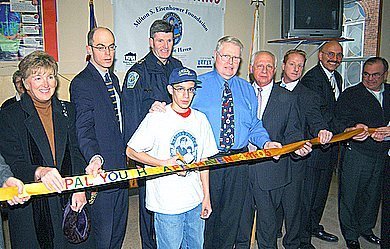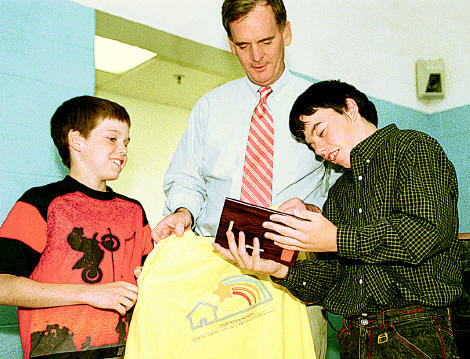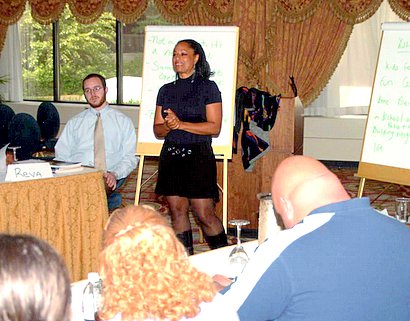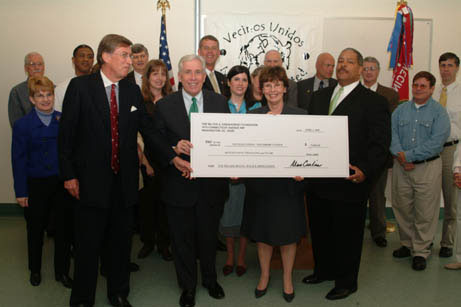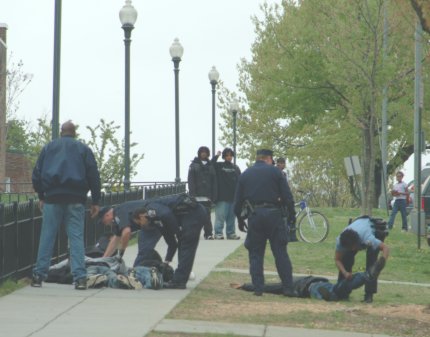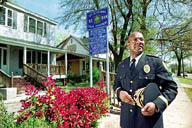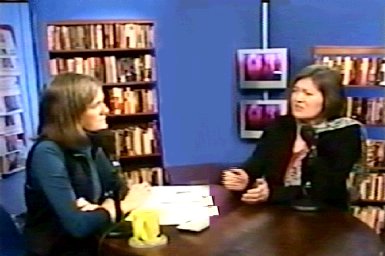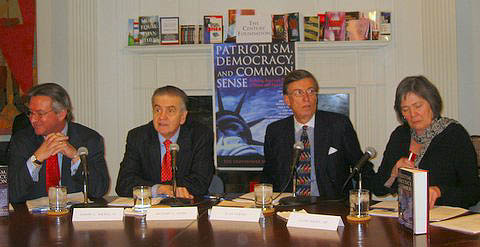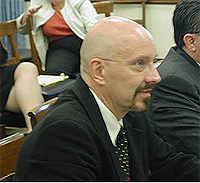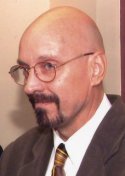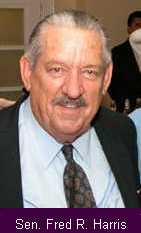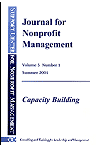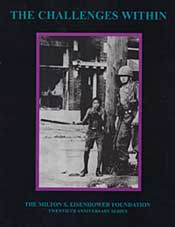|
|
||||||
|
Programs No Doubt About the Success of the Quantum Opportunities Program (Dover, NH) June 2, 2006 - There can be no doubt about the success of the Quantum Opportunities Program in Dover New Hampshire, according to an Op-Ed that appeared in Seacoast Online. Not only did the original group of students benefit, but local sources provided funding for additional students to participate. Read about the exciting outcomes of this four year program. Programs New Hampshire Quantum Youth to Lend a Hand for Katrina Victims (Dover, NH ) May 29, 2006 - Four years ago, a group of at-risk students, with a low probability of graduating high school, joined the Quantum Opportunities Program. Now they are graduating and several are heading to Waveland Mississippi to lend a hand in the Katrina cleanup. Read about the success of these young people. Programs New Quantum Opportunities Program in Baltimore looks at the Success Seen in Herndon, VA (Baltimore) May 22, 2006 - As preparations are underway to open a new Quantum Opportunities Program in the Sandtown neighborhood of Baltimore, the staff looks at the successes seen in similar programs, including one in the Northern Virginia city of Herndon. Click here to read the story by Gregory Kane of the Baltimore Sun. Programs Youth Center Celebrates Year of Progress
Staff member Katie Canatsey and Joseph Colgan (Herndon) April 13, 2006 - The Eisenhower sponsored Youth Safe Haven in Herndon, Virginia, is celebrating its first anniversary serving a diverse population of local and immigrant youths. Read the story here. Programs
Staff member Myron Evans assists Micael Taylor with Algebra In just six months, young people's lives are being changed, for the better (Jackson) April 10, 2006 - Normally, the four year Quantum Opportunities Program requires at least a year to begin having a measurable impact on student attitudes toward education and their grades. However, it appears that Quantum students in Jackson, Mississippi are developing new, positive attitudes toward school, after less than six months. Read the story here. Programs Eisenhower program forges alliance with police, college students to offer safe after-school instruction (Birmingham) March 20, 2006 - Students from the University of Alabama, Birmingham and Samford University have joined the civilian and police at the Youth Safe Haven in Southtown, to provide academic enrichment for 50 young people. To read more about this program, click here. Programs Planning for a Delancey Street Expansion in Baltimore is announced (Baltimore) February 24, 2006 - Planning has begun for a Delancey Street Replication in Baltimore. "The Delancey Street Project is designed to help communities replicate a successful program implemented in San Francisco to help ex-offenders called the Delancey Street Project. The ex-offender program is educational and entrepreneurial based." To read more about the Baltimore replication, click here. To read more about Delancey Street, click here.
Programs
Leigh Scott and Talesha Burke High School Seniors Prepare to Say Good Bye (Herndon) February 13, 2006 - Quantum Opportunities after school program comes to an end as Herndon High School seniors prepare for graduation. Read more about the success of the program in the Herndon Connection Article. Programs Nonprofit groups work to combat high re-arrest rates (Charelston-AP) February 20, 2006 - A coalition of non-profit and faith-based groups is working with the Eisenhower Foundation to establish a substance abuse treatment and career training program in Charleston, SC. To read the story from WIS TV10 news, click here. Programs City gets new tool in fight against crime (Birmingham) February 19, 2006 - The director of the Bimingham Urban League reminds city officials that in addition to their new Cease Fire program, the city has a new Youth Safe Haven - Police Ministation program that is the 'Right Tool' to deal with crime in the Southtown Public Housing Complex just east of the University of Alabama at Birmingham's campus. To read the story in the Birmingham News, click here. Programs Foundation to Help Charleston's Ex-Offenders Succeed (Charleston) February 14, 2006 - With property set aside on an old military base in North Charleston, S.C., the Eisenhower Foundation is set to start one of five new Delancey Street replication sites across the country. The Charleston site will provide free, long-term educational and vocational training and substance abuse rehabilitation programs, which are much needed in an area of South Carolina where close to 1,000 prisoners are released each year, many of whom have substance abuse problems. To read an article from the Charleston Post and Courier about the city's efforts to help ex-offenders, including the new Eisenhower program, click here. To learn more about Delancey Street, click here. Programs Full-Service Educators Gathered to Share Successes, Plan for the Future Recently, the Foundation brought educators and parents from full-service community schools across the country together in western Pennsylvania. The East Allegheny Middle School, an Eisenhower Foundation-funded full-service school, were gracious hosts to our Sixth National Cluster Workshop. The theme of the workshop was "Sustaining our Work-Creating Structures of Permanence." Around 50 participants shared their experiences and listened to speakers from other successful community schools. To read an article from the McKeesport Daily News about the workshop, click here. Programs Foundation Offering Hope, Opportunities in the South New Youth Safe Haven-Police Ministations in Birmingham and Tuskegee, Ala; Quantum Debuts in Jackson, Miss. and Birmingham Students from Lanier High School in Jackson, Miss., are the new beneficiaries of Eisenhower's tested and proven Quantum Opportunities Program, which uses computerized tutorials to help high-school students catch up -- and stay -- in school.
An hourly stipend doesn't hurt, either. Columnist Eric Stringfellow writes about this unique, four-year, educational enrichment program for ninth- to 12th-graders in the Jackson Clarion-Ledger.
For an additional report on the brand-new, first-ever Quantum Opportunities Program in Jackson, please click here.
A week later, Quantum Opportunities began at the first of the school year in Birmingham, Ala. at the city's Urban League headquarters -- and the city also received a new Youth Safe Haven-Police Ministation at the SouthTown housing community.
Programs Youth Safe Haven-Police Ministationsalso grow in SouthWith new Safe Haven-Police Ministations in D.C., New Hampshire, Virginia and elsewhere, the Milton S. Eisenhower Foundation continues to expand its after-school youth-development initiatives in the South -- with first-ever Safe Haven-Police Ministation sites in Tuskegee and Birmingham, Ala.
To read the Montgomery Advertiser's report about our most recent success in Tuskegee, click here.
For an account in the Tuskegee News, please click here.
Encouraging Words from Baltimore About Eisenhower Aid to Ex-Offenders Kudos came our way Wednesday, Oct. 12, when Baltimore Sun columnist Gregory Kane wrote a fine profile of our foundation -- a 25-year history in 500 words or less.
Kane focused on Eisenhower's efforts to replicate its anti-prison recidivism program in Baltimore -- where 59 percent of Maryland's parolees will return upon their release this year. Should you like to know a little more about us, and our Delancey Street Program for ex-convicts, please click here.
Programs Nashua,
NH
ribbon is Aldonys Reyonoso.
U.S. Senator Judd Gregg was on hand at the Seymour Osman Community Center in Dover to receive the Champion of Children award. The Eisenhower Foundation funds programs in three New Hampshire communities: Rochester, Dover, and Somersworth. See Full Story.
Programs Leila McDowell, Director for Capacity-Building Replications, helps participants to become more media savvy -- and thus more effective with members of the news media.
National Cluster Workshop Gathers Problem-Solvers from Cross-Country The Eisenhower Foundation theme of “Multiple Solutions for Multiple Problems” was on demonstration at the famed Watergate Hotel in Washington D.C. in June as the foundation hosted more than 60 partners from around the country to the National Cluster Workshop on Youth Safe Haven and Quantum Opportunities Program replication initiatives.
While the three-day workshop was designed to focus on youth safe haven/police ministations on the Quantum Opportunities program for high school youth, participants also took part in panel discussions on grant writing, media training, effective youth development strategies and better policing in public housing.
“These people represent the front-line of Eisenhower programs around the country,” said Johnnie A. Gage, Eisenhower Foundation COO. “The forum gives participants the opportunity to share their experiences and problem-solve," he said. "We want to act as a clearinghouse to impart information and discuss lessons learned.” Please click here for scenes from the workshop. Herndon, Va.
Photo by Robert L. Bailey Congressman Frank Wolf holds a $75,000 “check” from Eisenhower CEO Alan Curtis, left. At right is Vecinos Unidos president Chris Griffin and Herndon vice-mayor Darryl Smith, far right.
Programs Previously, Congressman Wolf joined Eisenhower Foundation staff, Herndon police officials and students from Herndon High School to celebrate the opening of the Quantum Opportunities Program there.
Above left, foundation president Alan Curtis stands with some of the Herndon youth enrolled in the Quantum Opportunities Program. The program begins in 9th grade, and continues though graduation from high school.
Above right, Congressman Wolf and Curtis discuss how the Quantum Opportunities Program will help Herndon's high-school youth with its four-year, computer-based model. Programs Eisenhower People
Reggie serves potluck with Cpl. Alfred Stewart at the Carver Terrace housing community in northeast DC.
Reginald Grant is one of many people who make Eisenhower Foundation programs run on time. Reggie is site director for the Carver Terrace Youth Safe Haven-Police Ministation in Washington, DC, as well as its Quantum Opportunities Program. To find out why Reggie is so remarkable, please click here.
Officer Triano and his family.
It takes a special kind of police officer, like Tony Triano, to work with kids as their primary job. To find out more about one of the dedicated officers that have worked with Eisenhower Youth Safe Haven / Police Ministation programs, click here.
Photo by Robert L. Bailey
Officers frisk handcuffed suspects as neighbors look on.
Carver Terrace Opening
Programs New York Times Opines on Quantum Opportunities
For teens in poor communities, The Eisenhower Foundation is replicating the Quantum Opportunities Program, for at-risk teenagers that has won the praises of education experts, policymakers and The New York Times. The program offers academic tutoring, computer based learning, stipends and money towards college. Initially, Quantum will be replicated in New Hampshire, South Carolina and Virginia.
Programs Positive Youth Development and the Youth Safe Haven -Police Ministation Program The service components of the Youth Safe Haven/Mini-Police Station programs are based largely on a theoretical framework known as Positive Youth Development, which focuses on the developmental needs of youth and building the assets that are required in order to make a successful transition to adulthood. Read our recent report on this program which provides an overview of positive youth development theory and shows how it is related to major features or strategies that serve as a foundation for effective programs.
Programs
Full-Service Community School Replications
"Community schools" or "full-service community schools" are partnering with private non-profit agencies to provide whatever services people need, from GED and job training classes to family therapy, homework help, and after-school programs.
Click here for the full article.
Programs
Effective
Capacity Building
What
Works
|
Policy
Father Baroni at confirmation hearings in 1977
Public-Morality Forum Televised on C-SPAN What Would Geno Do? What is public morality? Many religious and secular leaders believe it is more than personal morality – that it is about vision, and what journalist Walter Lippman called “pursuit of the good society.” How can we create a framework of public morality at a time when poverty has increased four years in a row, tax breaks are being given to the rich, domestic spending is being reduced, schools are becoming more segregated, and the public sector has failed New Orleans after the devastation of Hurricane Katrina? One man who dedicated his life to the pursuit of the good society was the late Father Geno Baroni, a secretary for the U.S. Department of Housing and Urban Development and the highest ranking priest in the federal executive branch of the government. On what would have been Baroni’s 75th birthday, the Eisenhower Foundation held a forum on public morality that gathered more than 30 government, religious and secular leaders to discuss his legacy and explore ways it can be put to practice today.
For a recap of the two-day forum, click here; for the forum agenda, please click here; for newspaper coverage, click here, and for a summary of the "Baroni Principles" please click here.
Policy Commentary: Invest Hawaii tax surplus in poverty solutions Eisenhower Foundation President Alan Curtis and Trustee Jeff Faux of the Economic Policy Institute spoke at Facing Hawai'i's Future: A Gathering for the Common Good, a forum held by Faith Action For Community Equity (FACE), a local coalition of churches, labor unions, grassroots groups, tenants' organizations and native Hawaiian groups. FACE, the largest advocacy coalition on the island, represents a constituency of over 38,000 that engages in actions and programs that challenge the systems that perpetuate poverty and injustice. Curtis and Faux spoke on the growing economic rift in America and the need for proven policies that help the truly disadvantaged, issues explored in the Eisenhower Foundation book Patriotism, Democracy and Common Sense. As part of the Eisenhower Foundation capacity building program, the Foundation provided critical media and organizing strategies to the coalition, helping it to achieve coverage and legislative victories on housing and long term health care. (To read more about Eisenhower Foundation's capacity building inititiave, click here). To read Alan Curtis' thought provoking op-ed in the major daily newspaper, the Honolulu Advertiser, click here. To read Columnist Jerry Burris' observations on Hawai'i's Next Social Revolution, click here. Michelle Takemoto of FACE believes that Hawai'i's Middle Class is in Trouble. To read her Op-Ed, click here.
To read the Honolulu Advertiser's editorial regarding support for caregivers, click here.
New from the Eisenhower Foundation
Policy |
|||||
|
|
Journal Report Sheds Light on
Lesser-Known Nonprofit Skills
The Eisenhower
Foundation publication Lessons
from the Street is featured in the latest edition of the
Journal for Nonprofit Management. The report assesses
ten years of capacity building and shares valuable wisdom.
While nonprofit community development corporations pursuing economic
development have been successful in capacity building and replication,
in part because there are excellent technical assistance and training
opportunities for them. Less is known about how to best provide technical
assistance and training for capacity building and replication to grassroots
nonprofit organizations working in "softer" fields -- like child and
youth development; public school innovation, job training, job placement,
advocacy, crime and violence prevention, drug prevention and community-police
partnerships. The Foundation study offers successful models on how
to do so.
For the full article, click
here.
A summary of
Milton S. Eisenhower Foundation programs and policy is available in the new publication,
Policy
National Conversation on Policy
Find out what the Eisenhower Foundation says about key issues facing the truly disadvantaged
Policy
Pablo's
Court
 Pablo
Eisenberg, Senior Fellow with the Public Policy Institute of Georgetown
University, tennis player extraordinaire and Eisenhower Foundation
board of trustees member, writes regularly for the Chronicle
of Philanthropy. We are pleased to share his ruminations on
politics, principles and philanthropy with you. Here are his latest
missives:
Pablo
Eisenberg, Senior Fellow with the Public Policy Institute of Georgetown
University, tennis player extraordinaire and Eisenhower Foundation
board of trustees member, writes regularly for the Chronicle
of Philanthropy. We are pleased to share his ruminations on
politics, principles and philanthropy with you. Here are his latest
missives:
Philanthropy Must Challenge Corporate America: Aug. 18, 2005
Excessive Executive Compensation
Needs to Be Stemmed: April 29, 2004
Charity and Foundation Abuses: March 18, 2004
When Charities Become Too Businesslike: June 10, 2004
Accrediting Charities Isn't Government's Role: Aug. 5, 2004
The Unsung Heroes of Philanthropy: May 1, 2003
Why Foundation Grants Shouldn't Mix With Politics: Feb. 6, 2003
The Buck Stops with the Board of Directors
-- Or at Least It Should: Oct. 17, 2002




